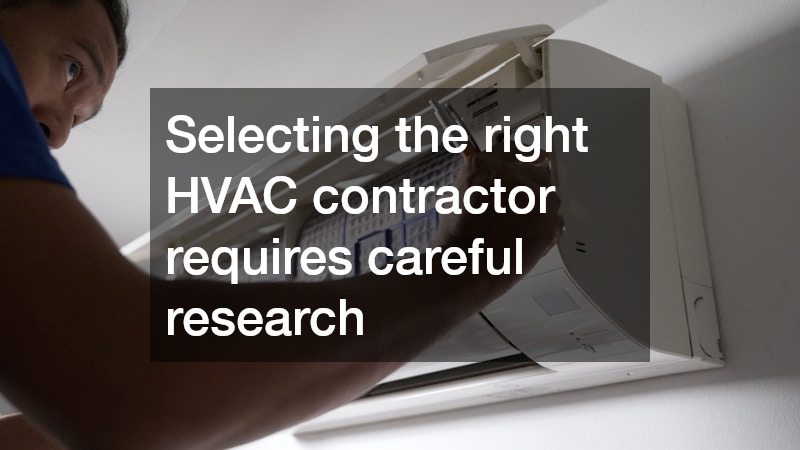Choosing the right HVAC contractor is essential for maintaining the comfort, safety, and efficiency of your home’s heating and cooling systems. A reliable contractor can make the difference between a system that operates efficiently for years and one that constantly requires repairs. With countless service providers available, the process of selecting a trustworthy professional can feel overwhelming. This guide will walk you through the key factors to consider when choosing an HVAC contractor, helping you make an informed decision and ensuring your home stays comfortable year-round.
Why is Licensing and Certification Important?
Understanding Licensing Requirements
One of the first steps in evaluating an HVAC contractor is confirming their licensing. HVAC licensing requirements vary by state, but generally, a license demonstrates that the contractor has met specific educational and professional standards and is legally permitted to perform HVAC work.
Hiring an unlicensed contractor may save money upfront, but it can result in costly mistakes, safety hazards, or violations of local building codes. Always check that your contractor holds a valid license for your state and the type of work you need performed.
The Role of Certifications
In addition to licensing, certifications provide insight into a contractor’s expertise. Certifications such as NATE (North American Technician Excellence) or EPA Section 608 indicate that the technician has undergone rigorous training and passed competency exams. These credentials often signal a higher level of knowledge and commitment to staying current with industry standards. Contractors with specialized certifications may be better equipped to handle complex HVAC systems, energy-efficient installations, or environmentally friendly refrigerants.
Verifying Credentials
Once you identify potential contractors, take steps to verify their credentials. Check the contractor’s license with your state’s licensing board and confirm the validity of any certifications. Be cautious of contractors who are hesitant to provide proof of licensing or certification, as this can be a red flag. Ensuring proper credentials not only protects you legally but also increases the likelihood of quality workmanship.
How to Evaluate Experience and Expertise
Years in Business
Experience matters when selecting an HVAC contractor. A company that has been in business for several years has likely developed the skills and knowledge necessary to handle a variety of systems and challenges. While newer companies can offer competitive pricing, established contractors bring reliability, proven problem-solving abilities, and references from past clients.
Specializations and Expertise
Different HVAC systems require varying levels of expertise. Some contractors specialize in residential systems, while others focus on commercial or high-efficiency systems. If your home requires a specific type of installation, such as ductless mini-splits, geothermal systems, or smart thermostats, seek a contractor with experience in that area. Specialized expertise can reduce installation errors, improve system performance, and extend the lifespan of your equipment.
Professional Affiliations
Membership in professional organizations, such as the Air Conditioning Contractors of America (ACCA), often indicates a contractor’s dedication to maintaining industry standards and continuing education. Affiliations like these demonstrate a commitment to professionalism, ethical practices, and staying informed about emerging HVAC technologies and best practices.
What Should You Know About Customer Reviews and References?
Online Reviews
Customer reviews are a valuable resource for assessing a contractor’s reputation. Look beyond star ratings and read the details of reviews to understand the experiences of past clients. Pay attention to patterns, such as consistent praise for punctuality or repeated complaints about communication. A contractor with mostly positive reviews and transparent responses to negative feedback is generally a safer choice.
Contacting References
Directly contacting references provides firsthand insight into a contractor’s work quality and reliability. Ask about the timeliness of the service, the professionalism of the team, and whether the system has performed well since installation or repair. Speaking with multiple past clients can help you gauge whether the contractor consistently meets expectations.
Handling Negative Feedback
No contractor will have perfect reviews, and negative feedback should be evaluated in context. Consider whether the contractor responded professionally and addressed the issue. Contractors who openly acknowledge mistakes and resolve them demonstrate accountability and customer service commitment.
What Questions to Ask During the Initial Consultation?
Technical Queries
During the initial consultation, ask technical questions to assess the contractor’s knowledge. Inquire about system recommendations, energy efficiency options, and solutions for any existing issues. A knowledgeable contractor should provide clear, understandable answers without overselling unnecessary services.
Cost and Estimates
Request a detailed written estimate that outlines labor, materials, and any potential additional costs. Comparing estimates from multiple contractors helps ensure you receive fair pricing. Avoid contractors who provide vague quotes or pressure you to make immediate decisions without adequate information.
Timeline and Availability
Discuss the project timeline and confirm the contractor’s availability. Whether you’re scheduling routine maintenance or a new installation, timely service is crucial for comfort and safety. A contractor who can align with your schedule while maintaining quality standards is ideal.
Selecting the right HVAC contractor requires careful research, thoughtful questions, and verification of credentials. By considering licensing, certifications, experience, customer feedback, and contract details, you can confidently choose a professional who will maintain your home’s comfort and energy efficiency. Investing time in this process not only ensures reliable service but also helps prevent costly repairs and extends the life of your heating and cooling systems. With the right contractor, your home will remain a comfortable and safe environment for years to come.



